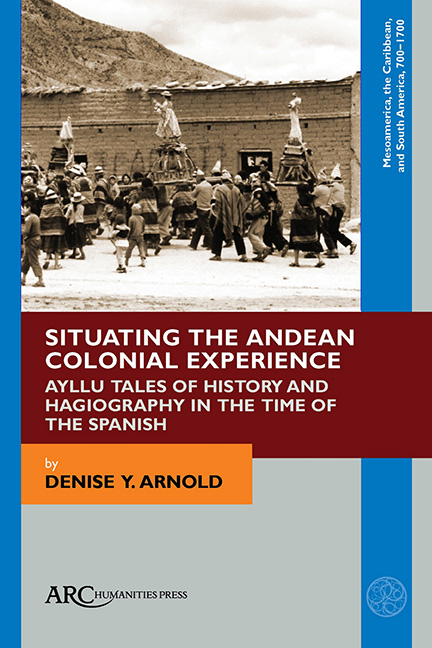 Situating the Andean Colonial Experience
Situating the Andean Colonial Experience Book contents
- Frontmatter
- Contents
- List of Illustrations
- Note About the Spelling of Toponyms and Proper Names
- Acknowledgements
- Maps
- Introduction
- PART ONE THE ORAL HISTORY OF QAQACHAKA
- PART TWO THE COLONIAL CACIQUES IN ORAL AND WRITTEN HISTORY
- PART THREE QAQACHAKA MARKA
- PART FOUR THE SAINTS APPEAR
- PART FIVE THE RELIGIOUS PRACTICES OF QAQACHAKA MARKA
- Some Conclusions
- Glossary
- Appendix A Document C of Don Franco Quispe Maraza
- Appendix B Document K of Don Franco Quispe Maraza
- Bibliography
- Thematic Index
- Index of Toponyms
Chapter 11 - Tata Quri wants a Family
Published online by Cambridge University Press: 22 June 2021
- Frontmatter
- Contents
- List of Illustrations
- Note About the Spelling of Toponyms and Proper Names
- Acknowledgements
- Maps
- Introduction
- PART ONE THE ORAL HISTORY OF QAQACHAKA
- PART TWO THE COLONIAL CACIQUES IN ORAL AND WRITTEN HISTORY
- PART THREE QAQACHAKA MARKA
- PART FOUR THE SAINTS APPEAR
- PART FIVE THE RELIGIOUS PRACTICES OF QAQACHAKA MARKA
- Some Conclusions
- Glossary
- Appendix A Document C of Don Franco Quispe Maraza
- Appendix B Document K of Don Franco Quispe Maraza
- Bibliography
- Thematic Index
- Index of Toponyms
Summary
Tata Quri was all alone …
Don Alberto Choque, from Qaqachaka puebloTHE NEXT JURIDICAL precondition to be fulfilled, so that a pueblo de indios like Qaqachaka could become transformed into a colonial cantón (in the medieval sense of this term as a “free city”), was that of accumulating enough Catholic saints in the central church to be able to celebrate a complete annual cycle of feasts.
This juridical precondition frames the following narratives of Qaqachaka's oral history, about the journeys of other saint-gods to the pueblo de indios, to become grouped together in the new church in the principal plaza of the marka. Each one of this ensemble of saints is identified with certain ancestors and lineages of the place, as their own gods and ancestors in common, precisely in order to fulfil the demands of the colonial laws. Once the ancestors had united sufficient gods to represent all the minor ayllus of the annex, they set out to accommodate them all in the new church.
First his Wife, Mama Candelaria
Although these ancestors sought to fulfil the terms of the colonial dispositions, their reasoning did not derive from a subservient attitude. The very first priority for them was that Tata Quri, in his protecting role towards them as “Our Father” (Awksa), was alone, and in need of a wife.
For Don Alberto Choque, the first option they considered was that of procuring other gods from the doctrinal capital of Condocondo, where they had already obtained materials for the church construction. The problem was that the priest there did not want to lose these other saints:
Tata Quri was all alone … And the people inquired around asking among themselves, “We could make a god here or we could bring them from other pueblos.” Then they proposed an option, “First of all we could bring those from Condo marka.”
However, they say that the priest didn't want to release them. “They’re mine,” said the priest. “If you want a god, then make one somewhere else,” he said. “Mine belong to others too. I can't just give them away; the community could eat me,” they say the priest said. “I’ve helped you with material and all, that's enough.
- Type
- Chapter
- Information
- Situating the Andean Colonial ExperienceAyllu Tales of History and Hagiography in the Time of the Spanish, pp. 217 - 246Publisher: Amsterdam University PressPrint publication year: 2021


